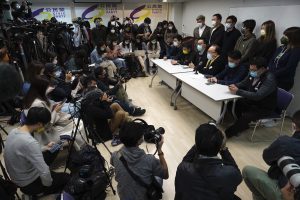[ad_1]

Pro-democratic party members shout slogans in response to the mass arrests during a press conference in Hong Kong Wednesday, Jan. 6, 2021.
Credit: AP Photo/Vincent Yu
In an early morning crackdown that sent shockwaves throughout the city, some 1,000 police officers in Hong Kong on January 6 arrested at least 53 residents, including pro-democracy activists, politicians, campaigners, and an American lawyer.
Through a spate of unprecedented raids, authorities detained individuals who had participated in holding an unofficial primary vote for the city’s legislative council election last July, which drew over 600,000 voters. Later that month, the election that would have followed the unofficial vote was postponed reportedly due to coronavirus-related concerns by Chief Executive Carrie Lam, and many candidates who participated in the primary were barred from contesting.
The clampdown – which involved the detainment of all the pro-democracy candidates from the unofficial primaries, as well as pollsters and organizers –more than doubled the number of people arrested under Beijing’s new national security law, which broadly criminalizes secession, collusion with foreign forces, and other forms of dissent. They stand accused of “subverting state power” for holding the primaries, and are suspected of attempting to gain a majority in the legislature with the aim of paralyzing the government, Hong Kong’s Security Minister John Lee said at a press conference.
According to the national security law, subversion charges are punishable by up to life in prison for “a principal offender” and three to 10 years in prison for someone “who actively participates in the offense.”
Ahead of the unofficial vote last year, Hong Kong’s constitutional affairs minister had warned that the primaries may violate the national security law, due to organizers’ calls for elected legislators to veto the government’s annual budget. Police will not target those who voted in the primaries, Lee said.
It was the biggest national security round-up the city has witnessed in the months since the law was imposed last summer – a period marked by regular crackdowns on the city’s pro-democracy movement. Hundreds have been arrested; a group of protesters caught at sea when attempting to flee to Taiwan were sentenced to prison in mainland China; media tycoon and activist Jimmy Lai was jailed; young icons Joshua Wong, Agnes Chow, and Ivan Lam were put behind bars; and 15 pro-democracy legislators resigned after four lawmakers were disqualified, leaving the legislature without an opposition.
Those arrested on Wednesday include former pro-democracy lawmakers Helena Wong, James To, Wu Chi-wai, and Claudio Mo, as well as young activists Ventus Lau, Tiffany Yuen, Gwyneth Ho, and Owen Chow, among others. Benny Tai, a legal scholar and high-profile figure of the 2014 Umbrella Movement protests who co-organized the unofficial polls, was also arrested. Tai previously wrote the op-ed “10 steps to laam chau,” which referred to a “scorched earth” doctrine of mutual destruction among protesters in last year’s demonstrations and outlined a predicted timeline for crackdowns between 202o to 2022. The plan was cited by Lee as evidence for the “vicious plan” to “sink Hong Kong into an abyss.”
Yet among those arrested are also individuals who are largely unknown in mainstream politics, and focus mainly on social issues. One such individual is Lee Ching-yung, a candidate who ran with the aim of making the city’s transport system more friendly for wheelchair users, in memory of his daughter who had a severe disability and commuted using a wheelchair daily before she passed away.
Another is Jeffrey Andrews, the city’s first registered ethnic minority social worker who has dedicated his life to helping refugees and ethnic minorities. Andrews is the also the first ethnic minority to run for Legislative Council – a decision he made in order to work toward greater representation and advocate for ethnic minority rights.
On Wednesday afternoon, remaining representatives from various pro-democracy groups held a press conference condemning the arrests, with Civic Party chairman Alan Leong saying he could not see why those who promised to exercise their power to veto budgets – as outlined in the Basic Law – would be considered subversive.
“We know that many in Hong Kong are very disappointed. But we appeal to the people of Hong Kong not to despair,” Leong said. “We should insist on speaking the truth and living in truth. There will be light in the end of the dark tunnel, and every dark night will see the dawn. So, let us stand and fight.”
[ad_2]
Source link